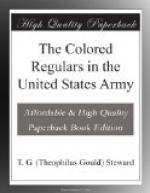Ten thousand sick soldiers were never on our hands before, and the mighty problem was not realized until the transports began to emit their streams of weakness and walking death at Montauk. The preparation was altogether inadequate for such a mass of misery, and for a time all appeared confusion.
Then came severe, cruel, merciless criticisms; deserved in some cases no doubt, but certainly not everywhere. The faults, gaps, failures, were everywhere to be seen, and it was easy to see and to say what ought to have been done. But the situation at Camp Wikoff from August 15th to Sep. 15th needed more than censure; it needed help. The men who were working for the Government in both the medical and commissary departments needed assistance; the former in the way of nurses, and the latter in the way of appropriate food. The censure and exposure indulged in by the press may have contributed to direct the attention of the benevolently disposed to the conditions in the camp.
Then came the era of ample help; from Massachusetts; from New York, in a word, from all over the country. The Merchants’ Relief Association poured in its thousands of dollars worth of supplies, bringing them to the camp and distributing them generously and wisely. The Women’s Patriotic Relief, the Women’s War Relief, the International Brotherhood League, and the powerful Red Cross Society, all poured in food and comforts for the sick thousands. Besides these great organizations there were also the spontaneous offerings of the people, many of them generously distributed by the Brooklyn Daily Eagle’s active representatives. The tent of that journal was an excellent way-mark and a veritable house of the good shepherd for many a lost wanderer, as well as a place of comfort, cheer and rest. The work done was very valuable and highly appreciated.
To the medical department came the trained hand of the female nurse. No one who saw these calm-faced, white-hooded sisters, or the cheery cheeked, white capped nurses from the schools, could fail to see that they were in the right place. The sick soldier’s lot was brightened greatly when the gentle female nurse came to his cot. Woman can never be robbed of her right to nurse. This is one of the lessons taught by the Hispano-American War.
This vast army has been handled. No yellow fever has been spread. The general health has been restored. The disabled are mostly housed in hospitals, and many of them are on the road to recovery. Some have died; some are on furlough, and many have gone to their homes.
The regulars are repairing to their stations quite invigorated, and greatly helped in many ways by the kind treatment they have received. Camp Wikoff was not a failure; but a great and successful object lesson, as well as a great summer school in nationalism. Here black, white and Indian soldiers fraternized; here Northerners and Southerners served under the same orders. Ten thousand soldiers and as many civilians daily attended the best school of its kind ever held in this country, striving to take home to their hearts the lessons that God is teaching the nations.




